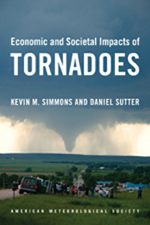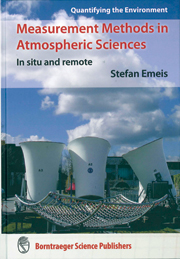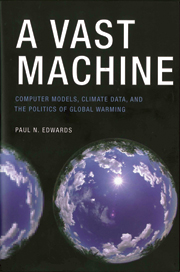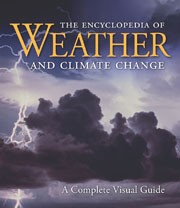Ronald B. Smith, Damon Wells Professor of Geology and Geophysics at Yale University, is the 2011 recipient of the Jule G. Charney Award. The award is in the form of a medallion. The Jule G. Charney Award is granted to individuals in recognition of highly significant research or development achievement in the atmospheric or hydrologic sciences. The AMS is honoring Dr. Smith for his fundamental contributions to our understanding of the influence of mountains on the atmosphere through both theoretical advances and insightful observations.
The Front Page spoke with Smith to learn more about him and his award-winning research. In the interview, which you can view below, he says that while he has been able to answer “maybe a third of the outstanding questions” about mountain meteorology in his career, recent graduates interested in this field of research will find many more that they can take on to advance the science.
Smith will receive The Jule G. Charney Award at Wednesday evening’s Awards Banquet (Washington State Convention Center halls 6A-B-C-D).
NCAR Scientist to Receive Rossby Research Medal and AMS Service Award
Joe Klemp, senior scientist with NCAR, is the 2011 recipient of meteorology’s most prestigious award: The Carl-Gustaf Rossby Research Medal. Additionally, Dr. Klemp is this year’s recipient of The Charles Franklin Brooks Award for outstanding contributions to advance AMS publications and education. He is an active member of the AMS Publications Commission, having served in the past as its commissioner.
The AMS awards the Rossby Research Medal to individuals on the basis of outstanding contributions to the understanding of the structure or behavior of the atmosphere. Klemp is being honored for illuminating the dynamics of mountain waves and thunderstorms, and for his contributions to improvements in numerical techniques and community models.
The Front Page recently sat down with Klemp to learn more about him and his career-spanning research. In the interview, which you can view below, he explains how the offer of a post-doctoral research position at NCAR “really changed the whole direction of my career.”
Klemp will receive his medal and service award at the AMS Awards Banquet Wednesday at 7 p.m. in the Washington State Convention Center, Hall 6A-B-C-D.
The Raj and Steve Show, Episodes 2 and 3
Your Conference Co-Chairs, Raj Pandya and Steve Ackerman, have been gleaning insights into the communication of weather and climate during the meeting. Episodes 2 and 3 of their continuing quest for Annual Meeting wisdom are available on the Ametsoc YouTube channel. In Episode 2, Steve (sensitively acknowledging Raj’s letdown of expectations for the Chicago Bears) talks about how science-driven information sometimes unintentionally creates high expectations for certainty when in fact uncertainty is a key to using such information wisely:
Then in Episode 3, Raj notes that scholars continue to puzzle over the communicative power of pictures, but have a firm grasp of the power of the word. Words, Raj points out, have the power to create pictures of their own, ultimately trumping numbers in their ability to motivate and convince an audience:
A New Way to Look at Tornadoes
 Its official release isn’t until next month, but the newest AMS book, Economic and Societal Impacts of Tornadoes, is debuting here in Seattle. The authors, Kevin Simmons and Daniel Sutter, are economists who gathered U.S. tornado casualty data from sources such as NOAA and the U.S. Census and used an economic approach to evaluate the National Weather Service’s efforts to reduce those casualties. The communication theme is a significant aspect of their analysis, and their book discloses some interesting findings on the efficacy of tornado warnings in the United States. The authors sat down with us at the Meeting to discuss their book and research.
Its official release isn’t until next month, but the newest AMS book, Economic and Societal Impacts of Tornadoes, is debuting here in Seattle. The authors, Kevin Simmons and Daniel Sutter, are economists who gathered U.S. tornado casualty data from sources such as NOAA and the U.S. Census and used an economic approach to evaluate the National Weather Service’s efforts to reduce those casualties. The communication theme is a significant aspect of their analysis, and their book discloses some interesting findings on the efficacy of tornado warnings in the United States. The authors sat down with us at the Meeting to discuss their book and research.
[And remember that other AMS books can be purchased at the skybridge near the AMS Resource Center (Exhibit Hall 4D). Signings will also be held there throughout the week–watch for the tweets!]
Serendipity Culminates in 'Highly Significant' Award
Frank Marks, Director of NOAA’s Hurricane Research Division, believes in serendipity. He jumped at an opportunity to conduct radar research on tropical cyclones for the Division some 30 years ago following a field project in western tropical Africa. There, in Dakar, he had serendipitously met his mentor, Verner E. Suomi, and hasn’t looked back since.
On Wednesday at the Awards Banquet (7 p.m. in the Washington State Convention Center, Hall 6A-B-C-D), the AMS will present Dr. Marks with the Verner E. Suomi Award for creative use of airborne Doppler radar and other technologies to advance the understanding of the dynamics of tropical cyclones. The AMS grants this award annually to individuals in recognition of highly significant technological achievement in the atmospheric or related oceanic and hydrologic sciences.
The Front page sat down with Marks to learn more about him and his career-spanning research. While wrapping up the interview, which you can watch below, he shared this perspective: “When an opportunity presents itself, you take it. That’s how I’ve lived my life.”
Science Meets Art on Floor 2
Art is a method of communication, a dialogue between artist and audience. The exhibit “Forecast: Communicating Weather and Climate,” currently on display on the second floor of the convention center, is also about communication between artists and scientists. The collaborative exhibit paired up Washington State artists with forecasters, climatologists, and atmospheric scientists with the idea that looking at weather and climate through a different lens opens up a new viewpoint and ultimately greater understanding. The end result is not only interesting artwork but what turned out to be enlightening experiences for those involved. Here’s one of the two interviews with the artists and scientists up on Ametsoc YouTube:
If you haven’t already, stop by to view the photography, paintings, and sculptures that portray the weather in a way you may not have seen before.
For more from the scientists’ perspective, take a look at University of Washington science writer Vince Stricherz’s article.
Nationwide Network of Networks–Now Is the Time for Your Input
by George Frederick, Chair, AMS Ad Hoc Committee on Network of Networks
Today’s Town Hall (WSCC 606, 12:15-1:15 pm) on the Nationwide Network of Networks (NNoN) coincides with the availability of a draft report by our committee, available online for comment and review.
The report is a result of the AMS’s intensive response to the 2009 National Research Council (NRC) report entitled, Observing the Weather and Climate FROM THE GROUND UP A Nationwide Network of Networks. It summarized the work of a committee of the NRC’s Board on Atmospheric Sciences and Climate charged with developing “…an overarching vision for an integrated, flexible, adaptive, and multi-purpose mesoscale meteorological observation network….” In “… identifying specific steps…that meet(s) multiple national needs…” the committee was given five guidelines:
- Characterize the current state of mesoscale observations and purposes;
- Compare the US mesoscale atmospheric observing system to other observing system benchmarks
- Describe desirable attributes of an integrated national mesoscale observing system;
- Identify steps to enhance and extend mesoscale meteorological observing capabilities so they meet multiple national needs; and
- Recommend practical steps to transform and modernize current, limited mesoscale meteorological observing capabilities to better meet the needs of a broad range of users and improve cost effectiveness.
The committee focused on the planetary boundary layer extending from 2 meters below the surface to 2-3 kilometers above in the United States, including coastal zones. Forecast time scales ranged up to 48 hours. It considered the roles of federal, state and local governments as well as the private sector. The goal was to guide development of “an integrated, multipurpose national mesoscale observation network.”
In reaction to the NRC report the AMS formed an ad hoc committee under its Commission on the Weather and Climate Enterprise to address the report’s recommendations and provide venues for community discussion and response. The committee launched its effort at the AMS Community Meeting in Norman, Oklahoma, in August 2009. Subsequently, six working groups have been busy addressing the recommendations in the NRC report.
The committee shares the vision of the NRC study, in which, ultimately, a “central authority” is required for the success of any nationwide network of networks. Traditional public-private-academic relationships will need to adjust to this new way of doing business—this will be a challenge for the entire community.
Other key recommendations include
- A stakeholder’s summit should be convened at an early date to foment the NNoN initiative and continue the momentum achieved to date. Implementation plans should be a follow-on result of this summit.
- As funding for a NNoN will be a challenge, an implementation strategy should be developed that prioritizes systems based on their economic benefits; e.g., it was evident that systems to improve observations of the earth’s boundary layer would benefit multiple users (wind energy, aviation, forecasting onset of convective activity) and should be given a high priority.
- Ongoing R&D and treating all networks (new and old) as perennial testbeds will be essential to success in constantly assessing and improving the member networks of the NNoN and developing new and innovative methods for observing earth’s boundary layer.
- That the NNoN adopt the Unidata Local Data Manager to provide the communications backbone for the NNoN.
- Metadata will be mandatory for applying data from the NNoN, and a combination of ISO 19115-2 and SensorML is recommended for the NNoN’s adopted metadata standards. Minimal and recommended sets of metadata elements should be adopted and well documented by the NNoN
- The human dimension must be considered when developing the NNoN and is key to engaging stakeholders and network operators as the market is developed. User assessments and education will be key parts of this effort.
State of the Union STEMwinder
by William Hooke, Director, AMS Policy Program, from the AMS project, Living on the Real World
Stemwinder? An old-fashioned mechanical watch needing winding. Now there’s a word that probably will disappear from the vocabulary in a few more years! Dictionary.com tells us that it’s also old slang for “a rousing speech, especially a stirring political address.”
But STEM itself is an acronym that will be with us for a while. It refers to Science-, Technology-, Engineering-, and Mathematics education.
President Obama’s speech last night called all this to mind. Partisans found much in his talk to like. And one area of emphasis was STEM education. An excerpt:
Maintaining our leadership in research and technology is crucial to America’s success. But if we want to win the future – if we want innovation to produce jobs in America and not overseas – then we also have to win the race to educate our kids.
Think about it. Over the next ten years, nearly half of all new jobs will require education that goes beyond a high school degree. And yet, as many as a quarter of our students aren’t even finishing high school. The quality of our math and science education lags behind many other nations. America has fallen to 9th in the proportion of young people with a college degree.(Emphasis added). And so the question is whether all of us – as citizens, and as parents – are willing to do what’s necessary to give every child a chance to succeed.
That responsibility begins not in our classrooms, but in our homes and communities. It’s family that first instills the love of learning in a child. Only parents can make sure the TV is turned off and homework gets done. We need to teach our kids that it’s not just the winner of the Super Bowl who deserves to be celebrated, but the winner of the science fair; that success is not a function of fame or PR, but of hard work and discipline.
Our schools share this responsibility. When a child walks into a classroom, it should be a place of high expectations and high performance. But too many schools don’t meet this test. That’s why instead of just pouring money into a system that’s not working, we launched a competition called Race to the Top. To all fifty states, we said, “If you show us the most innovative plans to improve teacher quality and student achievement, we’ll show you the money.”
There’s more to the president’s speech, but this gives the flavor. He is right to emphasize education. Most of us want to see American values maintained, advanced, and extended throughout the remainder of this century. If we were the most populous country in the world, perhaps we could tolerate a mediocre educational system and achieve such aims through sheer force of numbers. But given that we add up to no more than a few percent of the world’s people, we must ensure that our science and engineering are cutting edge. We must create and innovate. And for the world’s sake, the best of our accomplishments should contribute to sustainable development – new energy technologies; better understanding of Earth processes; greater use of renewable resources; knowing how to protect the environment and ecosystems.
Even were we the best in this arena there would be no cause for complacency. But lagging behind other countries with respect not just to STEM education but also attainment of college degrees? This is truly alarming. Such decline in educational standing is probably the most reliable leading indicator that future U.S. fortunes and U.S. standing in the world will decline in years ahead. A November post on Living on the Real World describes how an emphasis on Earth science in public education would help reverse this threat.
Here the American Meteorological Society can hold its head high. For decades Society staff (led initially by Ira Geer, and now by Jim Brey), and a vast and committed network of teacher-collaborators across the country have made Earth science accessible to American public-school students. This week at the Annual Meeting the 20th Symposium on Education was causing a lot of hallway buzz. Participants were finding the sessions especially lively and energizing. Are you one of their number? Are you working at one of the federal agencies – NSF, NOAA, NASA, the Navy, and others – who have supported this work? You should take special satisfaction in your contributions to world well-being.
Others of you should be pleased at this recognition for your efforts as well. James R. Mahoney (Chair), Martin Storksdieck (Director), and others standing up the new NAS/NRC Climate Change Education Roundtable should give yourselves a pat on the back. Are you working in the education programs of any of the federal agencies? Enjoy the moment. But in a sense, all of us in this community, as well as the media who cover our stories, are donating dollars, thought, and effort to this great cause. We should all feel good.
And then get back to the task at hand!
Meet the Winners, Then Read Their Books
 Got a long flight home after the meeting? Looking for some reading material to help pass the time? Then you should stop by the Atmospheric Science Librarians International booth (# 121) in the main Exhibit Hall at 4:45 p.m. on Wednesday for the 2011 ASLI’s Choice Book Awards. The ceremony will offer an opportunity to hobnob with some of the literati, as a number of authors of the honored books will be present to accept their awards.
Got a long flight home after the meeting? Looking for some reading material to help pass the time? Then you should stop by the Atmospheric Science Librarians International booth (# 121) in the main Exhibit Hall at 4:45 p.m. on Wednesday for the 2011 ASLI’s Choice Book Awards. The ceremony will offer an opportunity to hobnob with some of the literati, as a number of authors of the honored books will be present to accept their awards.
The ASLI’s Choice Committee selected the best titles from 2010 in three categories: science, history, and popular.
 The winner in the science category is Measurement Methods in Atmospheric Sciences: In Situ and Remote, by Stefan Emeis, which ASLI chose for being “a comprehensive overview of the many atmospheric monitoring and measurement methods and instruments.”
The winner in the science category is Measurement Methods in Atmospheric Sciences: In Situ and Remote, by Stefan Emeis, which ASLI chose for being “a comprehensive overview of the many atmospheric monitoring and measurement methods and instruments.”
The top choice in the history category is Vast Machine: Computer Models, Climate Data, and the Politics of Global Warming, by Paul N. Edwards, selected for its “insightful analysis of the models and data that form the basis of our understanding of climate change.”
In the popular category, the winner is The Encyclopedia of Weather and Climate Change : A Complete Visual Guide,  by Juliane L. Fry, Hans-F Graf, Richard Grotjahn, Marilyn N. Raphael, Clive Saunders, and Richard Whitaker, which ASLI describes as a “beautifully illustrated, authoritative and succinct introduction to meteorology and climate.”
by Juliane L. Fry, Hans-F Graf, Richard Grotjahn, Marilyn N. Raphael, Clive Saunders, and Richard Whitaker, which ASLI describes as a “beautifully illustrated, authoritative and succinct introduction to meteorology and climate.”
For the second year in a row, an AMS title will be feted, as Weather on the Air: A History of Broadcast Meteorology received an honorable mention in the history category. Author Robert Henson will be at the ceremony to accept his award, and he’ll also be signing copies of the book on the skybridge near the AMS Resource Center (Exhibit Hall 4D) on Wednesday from 2:45 to 4:00 p.m.
Top 10 Lists, NOAA-Style
The arrival of a new year is a good time to reflect on the significant events of the past 12 months. On Monday, Deke Arndt of NOAA’s National Climatic Data Center highlighted the noteworthy trends and events of 2010 in his talk, “The Climate of 2010 in Historical Perspective.” The presentation included these top-10 lists of notable 2010 events, as voted by a panel of weather and climate experts.
National Events
1. Consecutive Winter Blizzards/Extreme Snow Season (December-February)
2. Nashville and Central TN flooding (May)
3. Hot Summer in the East (June-August)
4. Midwest Super Storm (October)
5. Hawaiian Drought (Throughout 2010)
6. No hurricanes made U.S. landfall despite active Atlantic (June-November)
7. Near Eradication of CONUS Drought (July)

8. Vivian, SD Hailstone (July)
9. New England Flooding (February-April)
10. Minnesota as tornado leader (Spring & Summer)
Global Events
1. Russo-European-Asian Heat Waves (Summer)
2. 2010 as [near] warmest on record (Calendar Year)
3. Pakistani Flooding (Late July into August)
4. El Niño to La Niña Transition (Mid-to-Late Boreal Spring)
5. Negative Arctic Oscillation (December-February)
6. Brazillian Drought (Ongoing)
7. Historically inactive NE Pacific Hurricane Season (May 15-November 30)
8. Historic N. Hemispheric Snow Retreat (January through June)
9. Minimum Sea Ice Extent (Mid September)
10. China Drought (First half of 2010)